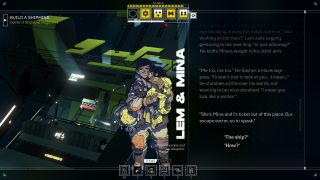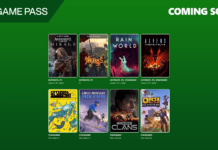PC Gamer is supported by its audience. When you buy through links on our site, we may earn an affiliate commission. Learn more
By published
An evocative life-sim RPG you won’t want to wake up from.
What is it? Dice-spending RPG about struggling to survive in a space station city.
Expect to pay: $20/£15
Release date: Out now
Developer: Jump Over the Age
Publisher: Fellow Traveller
Reviewed on: Windows 10, Ryzen 9 5900X, 32GB RAM, RTX 3080
Multiplayer? No
Link: Official site
Citizen Sleeper is like Blade Runner, but you’re a replicant. A synthetic being who has escaped from the corporation that built you, you hide on a space station that’s become a rogue state—home to revolutionaries, refugees, and a pirate gang. While you’re worrying whether you’ll be hunted down and dramatically shot in the back, you’re also worried about day-to-day survival.
Citizen Sleeper is great at encouraging you to live a routine. Where in Cyberpunk 2077 I only went to bed if I was trying to trigger a sidequest, here I lived a day-to-day cycle that included sleeping, eating, working, and feeding a stray cat. Some of it was mechanically necessary, and some of it was pure roleplay.
Lower numbers aren’t useless, as there’s another side to the station. In the data cloud, where your consciousness floats free of the synthmeat that needs to eat and sleep, you hack systems by spending dice—only here it’s about matching numbers rather than having high ones. I can spend a 1 seeing what this agent of the Yatagan gang is up to, or I could duck out of the data cloud and spend it working a shift at the noodle place, where even if I do a bad job at least I’ll be allowed to eat a few noodles and get back some energy.
So it’s not all Blade Runner. Citizen Sleeper ended up reminding me of Planetes, the series about blue-collar workers who collect garbage in space. Like Planetes, Citizen Sleeper is focused on ordinary people. Exploring each section of the station introduces new characters, who are depicted in expressive anime portraits superimposed on the station, beside which blocks of text tell their stories with choice-and-consequence moments of interaction.
Characters include a botanist studying the strange fungus that grows wild on the station, a bar-owner who wants to renovate, a shipyard worker trying to get off-station to find a better life for his daughter, and a mercenary whose ‘shipmind’ has been stolen. You never know who is going to be worth befriending. Some might abandon you, waste your time, or betray you. Who do you trust? 
More pressure is provided by the hunters. The corporation or their freelancers will track you down eventually, and every hack you perform gives the bestial AI who patrols the station’s cyberspace another whiff of your scent. Eventually, a reckoning will come.
As Citizen Sleeper goes on you get better at exploiting its systems, and find solutions to these problems. I made money playing a game called tavla at the Tambour Tearoom—like so many RPGs, gambling is the best way to get rich—and got my mushroom farm set up nicely. I even moved out of the shipping container I slept in. 
A couple of typos and a fair few punctuation errors mark the text, though the writing itself is excellent. All that focus on the mundane, the scavenging and surviving, makes the occasional glimpse of something profound feel potent—perhaps a poetic description of the flowing cyberspace data cloud and the impossible entities who live in it, or the endless physical space the station spins in, and the tiny individuals who find hope there.
That’s the best recommendation I can give Citizen Sleeper: it let me build a life I wanted to keep living. When I go, who’ll harvest the mushrooms? Who’ll feed that stray cat?
An evocative life-sim RPG you won’t want to wake up from.
Jody’s first computer was a Commodore 64, so he remembers having to use a code wheel to play Pool of Radiance. A former music journalist who interviewed everyone from Giorgio Moroder to Trent Reznor, Jody also co-hosted Australia’s first radio show about videogames, Zed Games. He’s written for Rock Paper Shotgun, The Big Issue, GamesRadar, Zam, Glixel, and Playboy.com, whose cheques with the bunny logo made for fun conversations at the bank. Jody’s first article for PC Gamer was published in 2015, he edited PC Gamer Indie from 2017 to 2018, and actually did play every Warhammer videogame.
Sign up to get the best content of the week, and great gaming deals, as picked by the editors.
Thank you for signing up to PC Gamer. You will receive a verification email shortly.
There was a problem. Please refresh the page and try again.
PC Gamer is part of Future US Inc, an international media group and leading digital publisher. Visit our corporate site.
© Future US, Inc. Full 7th Floor, 130 West 42nd Street, New York, NY 10036.









